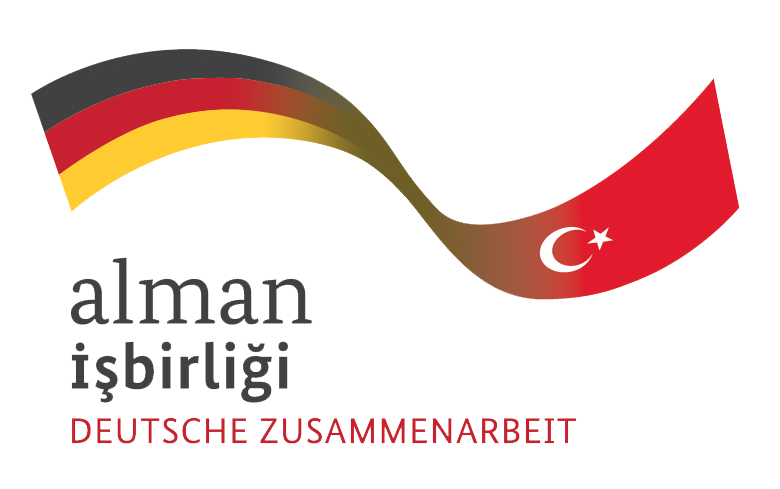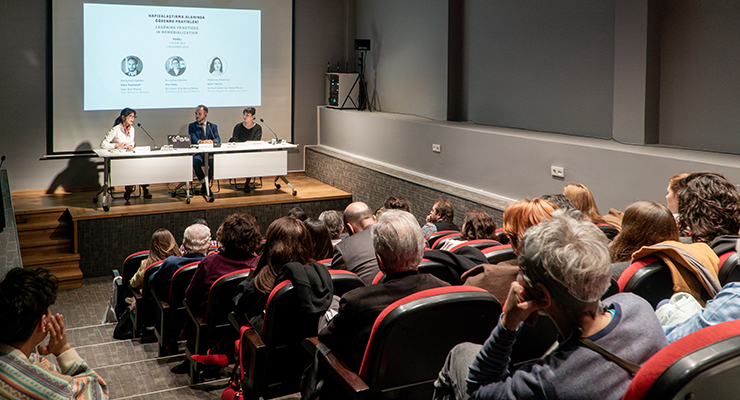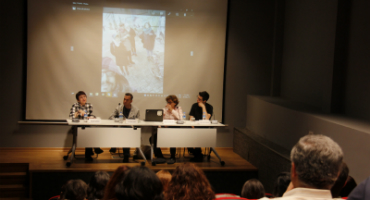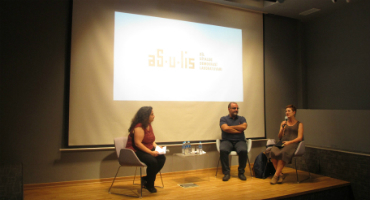The panel titled "Re(dis)covering Histories: Archives, Memory, and Politics”, organized within the scope of the project "Rights based learning programs to promote democracy, equality and existence", was held on Saturday, November 23, 2024, at the Hrant Dink Foundation, Anarad Hığutyun Building. The panel, moderated by Ayfer Bartu Candan from the Hrant Dink Foundation, was completed in two sessions. The first session of the panel included independent researcher and author Meltem Ahıska, Mezna Qato from Cambridge University and İren Bıçakçı, Lara Çakmak and Deniz Derya Dertli from the Hrant Dink Foundation as speakers, while in the second session, political scientist and chef Anna Maria Beylunioğlu and artist Hale Tenger made their presentations.
The moderator of the panel and Hrant Dink Foundation’s Research Coordinator, Ayfer Bartu Candan, opened the first session and explained the preparation process of the panel. Underlining the issues that will be discussed within the scope of the panel, namely the archive, confronting the past, cultural heritage politics, social memory and the relationships between these concepts are the topics that the Hrant Dink Foundation has been working on for years, Ayfer Bartu Candan stated that in addition to the aim of keeping Hrant Dink’s values, memory and works alive, the foundation also works on rethinking history. Noting that it is possible to see the traces of this understanding in all the projects the foundation has carried out to date, Ayfer Bartu Candan evaluated the panel as an opportunity to look at the issues from different contexts and in an interdisciplinary manner and gave the word to the first speaker, Meltem Ahıska.
Mezna Qato, who delivered her speech titled “Gaza’s Archivists” through visuals, stated that she aimed to ensure that participants witnessed the function of archives during an ongoing genocide. Stating that according to research conducted by the Institute for Palestine Studies, library archives were also destroyed along with ministry archives, Qato said that during the genocide, sources were also destroyed in a layered, deep and holistic manner. Detailing the search for methods to tell the stories of Palestinians after archive materials were transferred to the State of Israel, Qato shared a photo she took from her own window in Palestine in 1987 and said that people had an “urge to record”.
Reminding that there are ongoing genocides in the world, Qato said that whether they are visible or not, people who are subjected to genocides are trying to document and archive them in some way. Stating that archives are in a very important position for accountability, resistance, remembrance, reconstruction and demands for rights, Qato stated that in the current situation, the archive itself has become a form of resistance and disobedience. Qato evaluated the digital literacy of the new generation of archivists as an advantage that expands their room for maneuver, talked about the difficulties of writing the history of Palestine after 1948, and concluded her speech by drawing attention again to the need for new archive projects.
In their speech titled “Tracing Armenian Heritage Through the Archives of the Armenian Foundations”, İren Bıçakçı, Lara Çakmak and Deniz Derya Dertli from the Hrant Dink Foundation’s Archive project team explained the ongoing “School Archives Project” launched by the Hrant Dink Foundation in 2022. Bıçakçı, who started her speech by explaining the structures of Armenian foundations in Istanbul, stated that the foundation archives are considered as community archives because they provide materials on the social, economic and demographic data of the Armenian community, and conveyed that after the planning process, they moved on to the ongoing cataloging step after the classification and scanning stages, and uploaded the cataloged materials to the Hrant Dink Foundation’s online system, which is planned to be opened to access soon.
Bıçakçı, Çakmak and Dertli, who stated that the only remaining ones of the nearly 1400 Armenian schools known to have existed throughout Turkey are in Istanbul and that they worked with four of these schools within the scope of the archive project, continued their speech by mentioning the Şişli Karagözyan Orphanage, Galata Getronagan High School, Pangaltı Anarad Hığutyun School and Balat Surp Hreşdagabet Armenian Church and Horenyan School collections. Bıçakçı, Çakmak and Dertli explained how they traced local history, social and economic life of the period, communication between institutions, family and kinship histories and migration movements in the archives, and also said that they conducted oral history studies with people who passed through the mentioned institutions in order to enrich the archives. The archive team, who stated that nearly 16 thousand of the 80 thousand digitized documents were catalogued and uploaded to the digital system, concluded their speech by thanking all volunteers and consultants who contributed to the project.
The first speaker of the second session of the panel, Anna Maria Beylunioğlu, explained the process of Beledna, a project developed to preserve the memory of Antakya after the 2023 earthquake, to the participants in her speech titled “Mapping Memory and Identity in Post-Earthquake Antakya”. Beylunioğlu, who said that the Nehna platform, which initially set out to preserve the memory of the Orthodox people of Antakya, started to make different projects after the earthquake, stated that Beledna, whose foundations were laid when Çiğdem Mater sent a proposal on mapping memory, became an online memory map after funding was found for the project.
Beylunioğlu, who said that she read the hope, despair, wishes and longing born from memory through the online map, said that mapping also coincides with the goals of spreading will. Underlining that Beledna is an open and collective resource to which everyone can contribute, Beylunioğlu said that although it did not set out to archive, the project turned into an archiving tool through resistance. Beylunioğlu, who went over the entries added to Beledna since its launch in December 2023, concluded her speech by inviting everyone who has a memory of Antakya to contribute to Beledna.
The last speaker of the panel, Hale Tenger, talked about three of her works titled Decent Deathwatch: Bosnia-Herzegovina, I Know People Like This III and Beirut in in her speech “Beyond the Spoken and Written: Looking Through the Photographic Archives of Atrocities and War”. Stating that I Know People Like This III is based on photojournalist archives, Tenger added that the exhibition consisting of 732 images of political violence and state violence in Turkey is a collection that symbolically goes back to September 6-7 from the contemporary situations of 2013. Speaking about the problems of memory in Turkey, Tenger stated that she interpreted political violence as a “chronic disease that recurs” and said that the idea of exhibiting the photographs in the form of X-rays emerged in connection with this.
Tenger stated that the war was ongoing when she decided to make her 1993 work, Decent Deathwatch: Bosnia-Herzegovina, and said that after a difficult process, she was able to get permission and go to the Kırklareli Gaziosmanpaşa Refugee Camp, where she recorded the audio recordings of her interviews with people who had escaped from the war in Bosnia and integrated them into her work. She stated that the installation, which consists of around 800 water-filled jars containing images collected from the written press, television and books over the course of five months, also exhibited sections from the audio recordings inside the jars. Lastly, Tenger explained her decision and process to transform Beirut into a complete work by combining the images of the explosion-damaged facade of the St. Georges Hotel in Beirut with the sounds of conflict following the conflict between Israel and Lebanon in 2007. Tenger concluded her speech by saying that Beirut, which she dedicated to the people of Palestine and Lebanon, has an archive quality in itself.
Closing the panel, Ayfer Bartu Candan noted the importance of simultaneously talking about resistance while discussing state violence. She reiterated that heavy occurrences have happened in the geography of Turkey and Palestine and Lebanon, whose experiences were also shared in the panel, and underlined that resistance is permanent. Reminding of the necessity to gather strength and find ways to heal, Ayfer Bartu Candan concluded her words by evaluating continuing the projects and studies mentioned as ways to meet these requirements.




